

The Sitting Room. Sit down inside W.S.
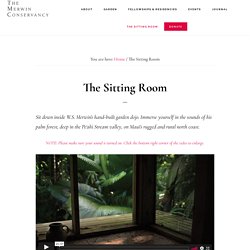
Climate Change Resource List - Women Who Sail® Photo Credit: Soraya Abdel-Hadi “Throwback Thursday to sailing in the North Pacific last year to explore the impact of plastics and toxics on an eXXpedition voyage.”
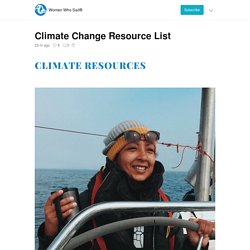
Exclusive to the Women Who Sail Newsletter, check out this amazing list of climate resources collected by our members to share with you. Te Rūnanga o Ngāti Whātua. By Chala Chase • 14 Sep, 2020 • It has been two months since we took to the streets of the Auckland CBD to protest the Dome Valley Landfill application.
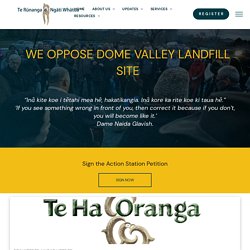
Our voices were loud, our presence was felt and our kaupapa was heard. Images of our hīkoi were plastered across national media, alerting the nation that this council/environmental issue wasn't going to be swept under the rug. What is Full-Spectrum, Living Water? - Dancing with Water. For thousands of years people have made reference to living water.
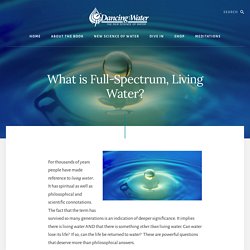
It has spiritual as well as philosophical and scientific connotations. The fact that the term has survived so many generations is an indication of deeper significance. Error - Cookies Turned Off. In 2007 the National Institutes of Health launched the Human Microbiome Project (HMP), an interdisciplinary research initiative seeking to characterize the contribution of human gut microbiota to health and disease (Turnbaugh et al., 2007).
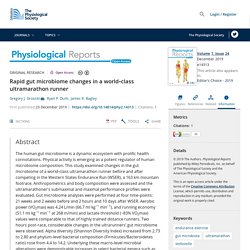
Subsequent findings have demonstrated compelling relationships between human gut microbiome composition and many leading causes of death worldwide including cardiovascular disease (Wang et al., 2011), diabetes (Larsen et al., 2010), and cancer (Ahn et al., 2013). Although the gut microbiome is suggested to exhibit exceptional plasticity (Gomez et al., 2019), a detailed understanding of the factors determining human microbiome assembly is lacking (Relman, 2015). Recently, our group (Durk et al., 2018) and others (Allen et al., 2018; Keohane et al., 2019; Scheiman et al., 2019) have shown a link between physical activity and human microbiome composition, aiding in the delineation of a signature microbiome response to exercise training. The Stink About Human Poop As Fertilizer. Some waste treatment plants burn it or ship it to landfills, which aren’t the most economically or environmentally friendly solutions.
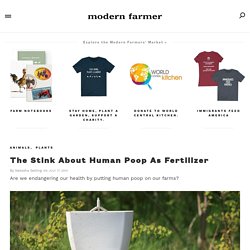
But not all poop ends its life by fire or burial. Some human waste ends up in forests and farm fields as the treated, human-feces-based fertilizer known as biosolids. Find the idea of growing tomatoes with human excrement repulsive? It’s a common response, one that Washington State University soil scientist Craig Cooger finds strange. Does Soil Contribute to the Human Gut Microbiome?
Olives. Garden, chooks. Planting wetland and natives. Bees. Nature. Palm oil, corporate greed. WasteMINZ. WasteMINZ is the largest representative body of the waste, resource recovery and contaminated land sectors in New Zealand.
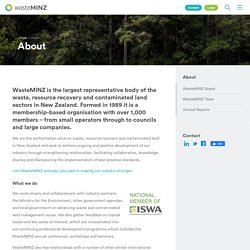
Formed in 1989 it is a membership-based organisation with over 1,000 members – from small operators through to councils and large companies. We are the authoritative voice on waste, resource recovery and contaminated land in New Zealand and seek to achieve ongoing and positive development of our industry through strengthening relationships, facilitating collaboration, knowledge sharing and championing the implementation of best practice standards. Join WasteMINZ and play your part in making our industry stronger. What we do We work closely and collaboratively with industry partners, the Ministry for the Environment, other government agencies, and local government on advancing waste and contaminated land management issues.
Membership. Podcast interview with Akira Sakano on zero waste cities. Podcast interview with Akira Sakano on zero waste cities. What's in Season. What are the 34 categories of waste in Kamikatsu, the 'zero waste' town? Kamikatsu, Tokushima. Town in Shikoku, Japan Kamikatsu (上勝町, Kamikatsu-chō) is a town located in Katsuura District, Tokushima Prefecture, Japan.
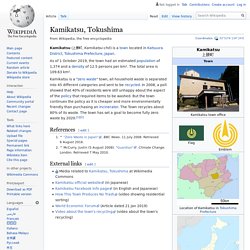
As of 1 October 2019[update], the town had an estimated population of 1,374 and a density of 12.5 persons per km². The total area is 109.63 km². Kamikatsu is a "zero waste" town, all household waste is separated into 45 different categories and sent to be recycled. In 2008, a poll showed that 40% of residents were still unhappy about the aspect of the policy that required items to be washed. References[edit] ^ "Zero Waste in Japan". External links[edit] Live Lightly - Eat locally and seasonally. White gold: the unstoppable rise of alternative milks. In the spring of 2018, New York was gripped by a sudden, very particular and, for some, calamitous food shortage.
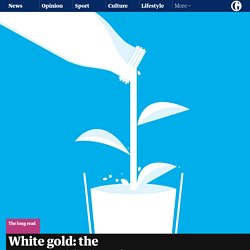
Gaps appeared on grocery shelves. Coffee shops put out signs, turning customers away. Twitter and Instagram brimmed with outrage. What would happen if everyone went vegan? The idea of everyone adopting a vegan diet might sound extreme, but in the last decade, the number of people in the UK following a plant-based diet has risen 340%.
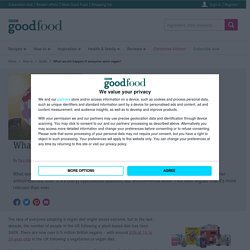
There are now over 0.5 million British vegans – with around 20% of 16 to 24-year-olds in the UK following a vegetarian or vegan diet. You can see this growing interest in veganism all around us. Food in 2050: bacon grown on blades of grass and bioreactor chicken nuggets. In 2004, the Guardian correctly predicted that the developed world’s overreliance on meat would be one of the most pressing issues for the survival of our species. “Britons need to say goodbye to burgers and meat,” we wrote, “because the overemphasis on meat in the western diet is one of the things that stifles sustainable food production.” Thankfully, the past decade and a half has seen an unprecedented interest in meat-free diets. In 2004, veganism was seen as a fussy, faddish lifestyle choice. The Plastic Mountain. Tonnes of plastic and waste were found in one such dump in the port-city of Surabaya on the island of Java. Brands that are not sold in Indonesia could be identified in the stacks of rubbish.
“There’s this narrative in developing countries that if you want to manage your waste properly, look at developed countries. What is less known is, actually, developed countries aren’t doing that much better, they’re just sending their waste to us,” says Mafira. ONE Only Natural Energy – Magazine on sustainable energy, climate change, innovation and environment.